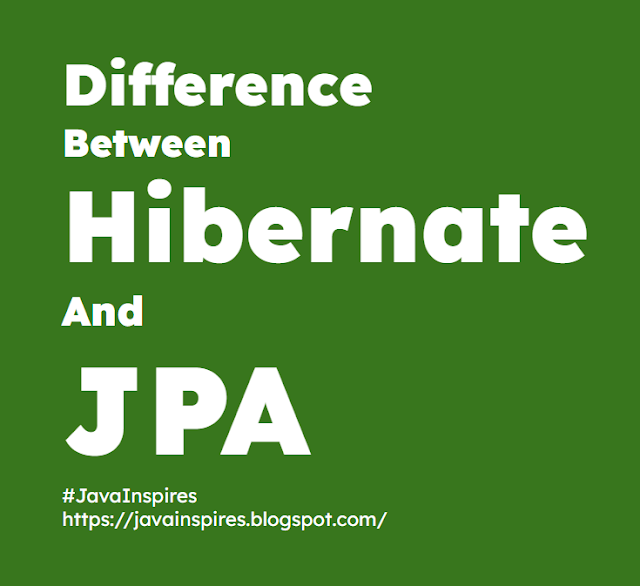In this post, we will learn the difference between Hibernate and JPA.
As a software engineer, working with databases is an integral part of developing applications. In the Java ecosystem, two popular technologies for handling database operations are Java Persistence API (JPA) and Hibernate. In this blog post, we'll explore the differences between JPA and Hibernate, their advantages and disadvantages, and how to choose the right solution for your project.
What is JPA?
Java Persistence API (JPA) is a specification that defines a standard for object-relational mapping (ORM) in Java applications. It provides a set of annotations and interfaces that allow developers to map Java objects to database tables and vice versa. JPA simplifies database operations by abstracting the underlying database implementation, making it easier to switch between different databases.
advertisement
What is Hibernate?
Hibernate is an open-source ORM framework that implements the JPA specification. It provides a powerful and flexible solution for mapping Java objects to relational databases. Hibernate offers advanced features such as caching, lazy loading, and query optimization, making it a popular choice for enterprise applications.
Key Differences Between JPA and Hibernate:
1. Specification vs. Implementation: JPA is a specification, while Hibernate is an implementation of that specification. JPA provides a standard set of rules and guidelines for ORM, whereas Hibernate is a concrete framework that follows those rules and provides additional features.
2. Portability: Since JPA is a standard, it allows for greater portability between different ORM implementations. If you use JPA annotations and interfaces, you can easily switch to another JPA-compliant ORM framework without changing your code. Hibernate, on the other hand, is tied to its specific implementation, making it less portable.
3. Features: Hibernate offers a more extensive set of features compared to JPA, such as caching, lazy loading, and query optimization. These features can improve the performance and scalability of your application. However, they may also introduce complexity and require additional configuration.
4. Learning Curve: JPA has a simpler and more straightforward approach to ORM, making it easier to learn and use for beginners. Hibernate, with its advanced features and configuration options, can have a steeper learning curve.
5. Community and Support: Hibernate has a large and active community, providing extensive documentation, tutorials, and support. While JPA also has a strong community, it may not be as comprehensive as Hibernate's due to its nature as a specification rather than an implementation.
Choosing the Right Solution:
When deciding between JPA and Hibernate, consider the following factors:
1. Project Requirements: If your project requires advanced ORM features such as caching or query optimization, Hibernate may be the better choice. However, if you need a simpler and more straightforward solution, JPA may be sufficient.
2. Portability: If you want to maintain the flexibility to switch between different ORM frameworks, using JPA as a standard is a better option.
3. Learning Curve: If you're new to ORM or prefer a simpler approach, JPA may be more suitable. However, if you're willing to invest time in learning and mastering advanced features, Hibernate can provide a powerful and flexible solution.
4. Community and Support: Both JPA and Hibernate have strong communities, but Hibernate's extensive documentation and resources may be more helpful for developers seeking guidance and support.
advertisement
Conclusion:
In this blog post, we've explored the key differences between JPA and Hibernate, and discussed how to choose the right solution for your project. As a software engineer, understanding the advantages and disadvantages of each technology is crucial for making informed decisions and developing efficient, maintainable applications. By considering factors such as project requirements, portability, learning curve, and community support, you can select the ORM solution that best fits your needs. Happy coding!
